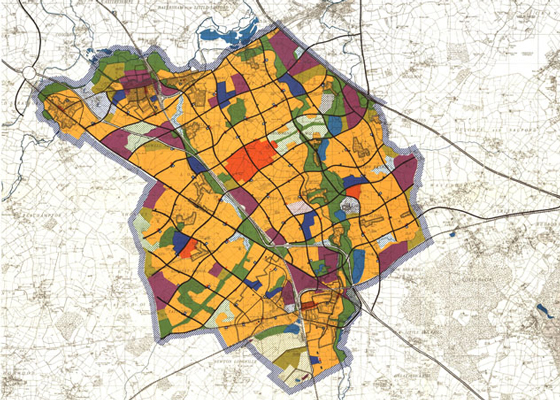Planning and Community in the ‘non-place urban realm’
Talks and Discussions
Friday 4 October
1–3pm
FREE
Book now
Booking essential
Suitable for ages 16+


Milton Keynes originated in the 1960s – an optimistic decade for ideas and visions about the future of society. Its planners were thinking afresh about their role in building a city: they wanted to avoid the paternalism of previous new town design, and to avoid constraining or determining their city’s future; they spoke of “permitting the maximum freedom of future social patterns to develop.”
One key source of these ideas was American social theorist Melvin Webber, who imagined a society of “community without propinquity” – where community would no longer be defined by proximity, or limited by neighbourhoods. He saw Milton Keynes as the test-bed for what he called the “non-place urban realm” – in the words of one of his colleagues, the idea that “with increasing accessibility, the city itself becomes transformed from a place into a web of interactions at varying geographic scales.” It is from these ideas that we have the grid-roads – a flexible structuring device for city-wide communications. While Webber’s ideas about urbanism fell out of fashion in later decades, it is clear today—given the rise of the internet and social media—that his thinking was prescient.
2019 is projected as the year that Milton Keynes, as a built up area, reaches the population targets of the original plan, and further growth is planned. Yet homes are becoming highly unaffordable, and it is widely agreed that public transport provision within the city remains deficient. This makes 2019 a key moment for the history and social development of the city, and for possible re-consideration of its planning principles. As we move into new phases of growth and expansion, how should development be structured, and can we reclaim some of Webber’s ideas about mobility, freedom of choice and the future of community?
This roundtable discussion will feature planners past and present in discussion with historians and community advocates, and will conclude with an open audience Q&A session.
Initiated, developed and chaired by David Mountain, PhD Candidate at University of Manchester, as part of a placement with Milton Keynes City Discovery Centre, which was funded by the North West Social Sciences Doctoral Training Partnership.
AddressMeeting Place
One key source of these ideas was American social theorist Melvin Webber, who imagined a society of “community without propinquity” – where community would no longer be defined by proximity, or limited by neighbourhoods. He saw Milton Keynes as the test-bed for what he called the “non-place urban realm” – in the words of one of his colleagues, the idea that “with increasing accessibility, the city itself becomes transformed from a place into a web of interactions at varying geographic scales.” It is from these ideas that we have the grid-roads – a flexible structuring device for city-wide communications. While Webber’s ideas about urbanism fell out of fashion in later decades, it is clear today—given the rise of the internet and social media—that his thinking was prescient.
2019 is projected as the year that Milton Keynes, as a built up area, reaches the population targets of the original plan, and further growth is planned. Yet homes are becoming highly unaffordable, and it is widely agreed that public transport provision within the city remains deficient. This makes 2019 a key moment for the history and social development of the city, and for possible re-consideration of its planning principles. As we move into new phases of growth and expansion, how should development be structured, and can we reclaim some of Webber’s ideas about mobility, freedom of choice and the future of community?
This roundtable discussion will feature planners past and present in discussion with historians and community advocates, and will conclude with an open audience Q&A session.
Initiated, developed and chaired by David Mountain, PhD Candidate at University of Manchester, as part of a placement with Milton Keynes City Discovery Centre, which was funded by the North West Social Sciences Doctoral Training Partnership.
Address
Meeting Place
Midsummer Boulevard
(opposite The Point)
MK9 3NB
© Milton Keynes Development Corporation, Crown Copyright. Issued under the Open Government Licence v.3.0. Images courtesy of Milton Keynes City Discovery Centre.
![]()
